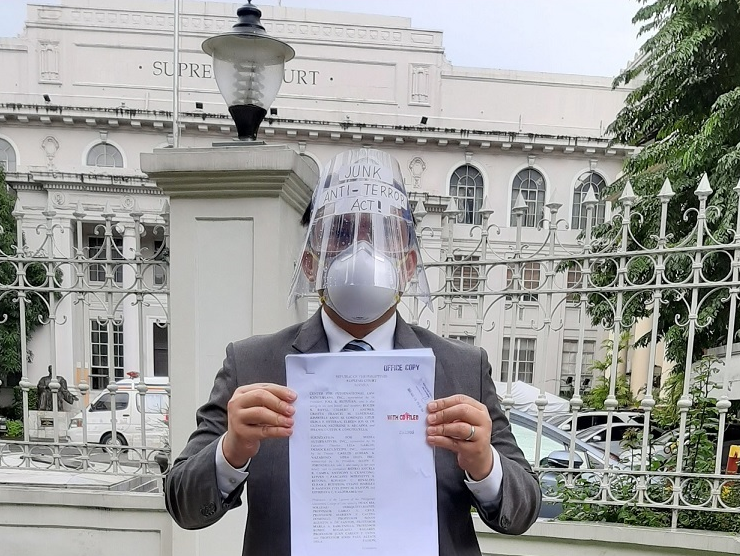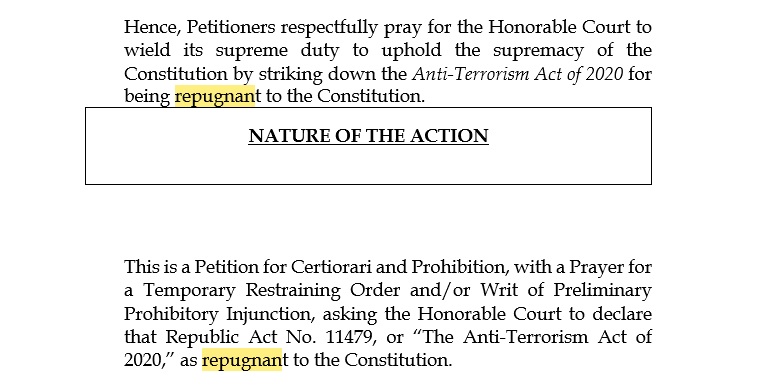The Supreme Court declared two provisions under the contentious Republic Act (RA) 11479 or Anti-Terrorism law unconstitutional but left the other controversial issues intact.
The decision, arrived at during its Dec. 7 en banc meeting to deliberate on the petitions challenging the law, was released through a media statement released Thursday.
Voting 12-3, the High Court found the qualifier to the proviso under RA 11479’s Section 4 that attempted to punish dissent which poses a “serious risk to public safety” unlawful saying it was “overbroad and violative of freedom of expression.”
Also thrown out by a vote of 9-6 was a clause in Section 25 that permitted the Anti-Terrorism Council (ATC) to classify persons or organizations as terrorists in response to recommendations from other authorities.
RA 11479, signed into law by President Rodrigo Duterte on July 3, 2020, took effect three weeks after.
The SC received over 37 petitions that challenged the controversial law. Several groups sought to declare RA11479 as unconstitutional for various reasons, including unquestionable provisions that violate the Bill of Rights.
Most of the provisions were upheld, including the contentious clauses on
the 24-day custody of suspected terrorists and the ATC’s right to label
civilians as terrorists.
LILAK, or the Purple Action for Indigenous Women’s Rights, an organization advocating for the empowerment of indigenous women, was disconcerted by the decision of the High Tribunal.
“We express fear and discontentment that the decision of the Supreme Court still upholds the repressive law. The mere existence of the terror law spells more thorns in the lives and struggles of indigenous women and their communities,” they said in a statement.
(Read: IPs fight vs anti-terror law gains global support)
Karapatan Secretary General Cristina Palabay, one of the petitioners against the law, said,“That the terror law was the most contested law in Philippine history only shows the widespread opposition to this dangerous piece of legislation which directly harms our basic rights and freedoms. The Supreme Court’s decision to adopt repressive provisions – the vague and overbroad definition of ‘terrorism,’ arbitrary powers of the Anti-Terrorism Council to designate and freeze assets of individuals and organizations, and the long period of warrantless detention — will only set to worsen the already dismal human rights situation in the country.”
Akbayan First Nominee Percival Cendana said,”This is a devastating blow for human rights and democracy. The Supreme Court missed the opportunity to defend the Filipino people’s human rights and democracy.”
A coalition of lawyers led by Center for International Law (CenterLaw), human rights advocates, and journalists, including VERA Files, filed a petition in August last year seeking to declare this provision unconstitutional.
(Read: Coalition of journalists, lawyers, HR advocates seek nullity of anti-terror law)
Part
of the coalition’s petition read: “The Anti-Terrorism Act ‘gives unbounded
power and discretion to the police and the military in ascertaining and
declaring what constitute acts of terrorism, even assigning to them the
authority to arrest mere suspects who may be detained for 24 days without
bringing charges against them in court.”
(Read: Anti-terror law weakens judicial independence)
The petition also said the ATA debilitated the independence of the judiciary.
“The Anti-Terrorism Act poses a grave and present danger to judicial power and independence. Thus, the SC should strike down the ATA if the High Court wants to protect the judiciary’s institutional independence,” CenterLaw’s Gilbert Andres said.

